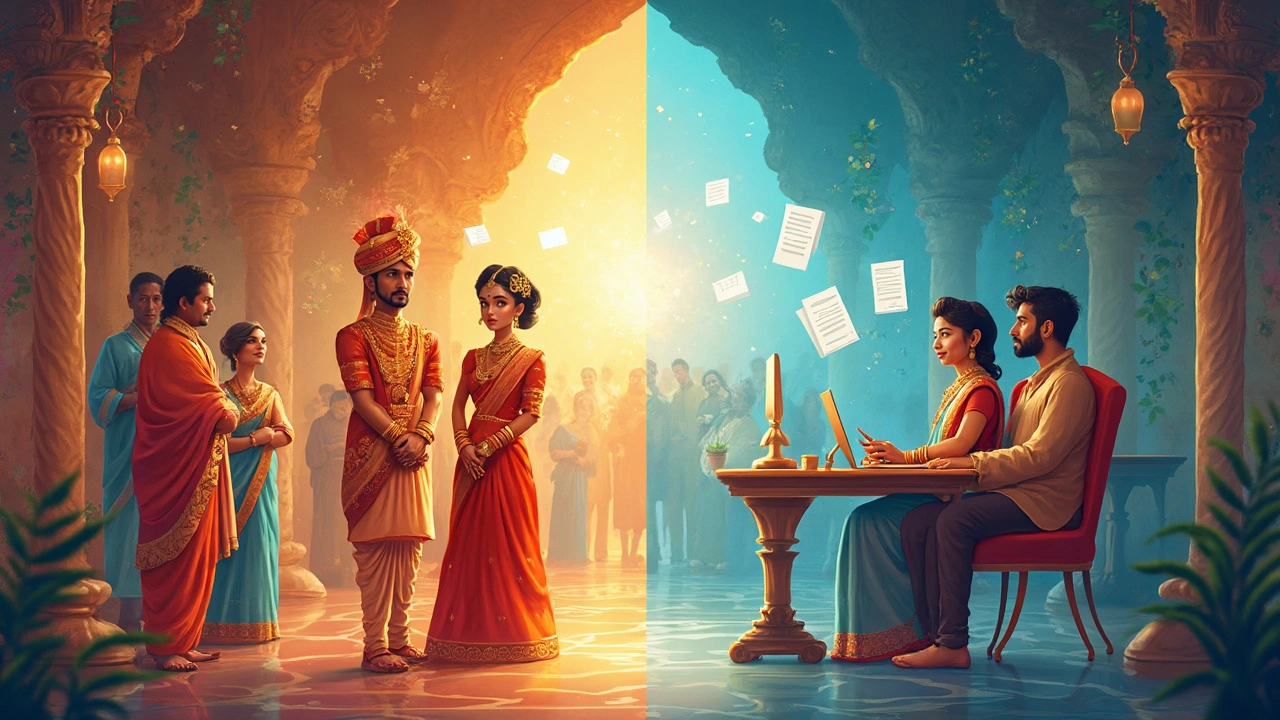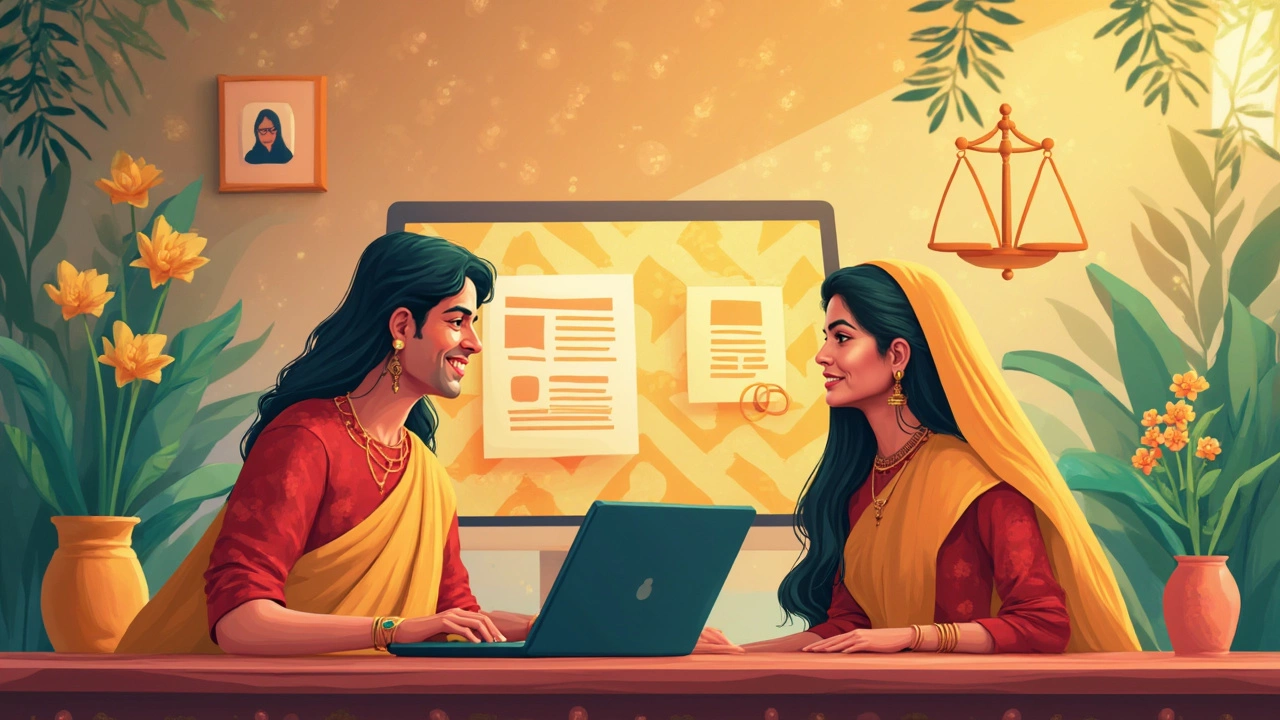So, you're wondering if online marriage registration is the real deal in India, huh? Well, you're not alone, and it's a pretty good question in today's tech-savvy age. With everything from schooling to shopping going digital, it's no surprise that marriage registration is jumping on the bandwagon. But is it actually legal to tie the knot online in India? Let's break it down.
First things first, marriage in India is governed by several laws like the Hindu Marriage Act, the Special Marriage Act, and a few others depending on your religion. Traditionally, these laws required people to physically show up at the registrar's office. But thanks to technology and the pandemic pushing us all to adapt, online processes have made a splashy entrance.
Many states in India have introduced online portals for initial steps like filling out forms and booking appointments. A complete online marriage, without any physical presence ever, is still a bit of a stretch legally speaking. But these digital moves make the red tape a whole lot less annoying.
Legal Framework
Now, diving into the nitty-gritty of how online marriage registration holds up legally in India. This is where things might get a little technical, but hang tight—it's important stuff.
In India, marriage registration is primarily governed by the Special Marriage Act of 1954 and the Hindu Marriage Act of 1955, among others depending on religion and personal law. These acts traditionally require both parties to be physically present before the marriage officer to complete the process. But with technology becoming a major player, there's been some wiggle room.
Many states now allow couples to initiate the registration process online. This means prospective couples can fill out the forms, submit documents, and book appointments through state-specific online portals. While the final step still requires an in-person appearance to either witness the marriage or complete legal formalities, having much of the grunt work done online seriously cuts down on time and hassle.
An interesting fact: States like Delhi, Maharashtra, and Karnataka have been at the forefront by offering comprehensive online platforms where a significant proportion of the registration workload can be digitally managed.
Here's what you generally need:
- Proof of age documents like a birth certificate or school leaving certificate.
- Address proof such as an Aadhaar Card, Utility Bill, or Passport.
- Passport-sized photographs of the couple.
- Proof of marriage like invitation card and photographs of the ceremony.
Keep in mind, the physical presence is still non-negotiable for the actual witnessing of the marriage, as per the current legal requirements. However, the convenience of starting the process online is a game-changer for many.
Online Registration Process
Jumping into the world of online marriage registration might seem a bit out there, but it's pretty straightforward once you get the hang of it. In India, most states have set up portals to get you started with the whole marriage registration process online. But, there's still a part where you physically show up, so it's a mix of digital and traditional steps.
Initial Steps to Knowing the Process
First, you need to visit the official marriage registration portal of your state. These portals are designed to make things easier, allowing you to fill up the application form from the comfort of your home. Before jumping into it, make sure to have all necessary documents handy. These typically include age proof, address proof, passport-size photographs, an affidavit of marriage, and witness details.
Step-by-Step Guide to Online Registration
- Fill the Application: Head to your state’s marriage registration website. Start by filling out the online application form with details like name, age, address, and the date of the marriage ceremony.
- Upload Documents: Scan and upload all necessary documents. Double-check their clarity, as blurry uploads can cause delays.
- Select an Appointment: Pick a date when you and your partner can physically go to the registrar’s office. This might vary based on the availability of slots.
- Pay the Fee: Complete the process by paying the applicable fee online. This fee can differ from state to state, so keep an eye on the amount.
- Verification: After submission, there's an online verification process. Make sure all typed info matches the documents you've uploaded to avoid a hassle later.
Final Steps
Once all online formalities are done, you and your partner need to visit the marriage registrar’s office in person on the selected date along with your witnesses. This last step is crucial, as that's when the marriage is officially recorded as per the law.
Pros of Online Registration: The whole online marriage registration process cuts down on waiting times and long queues. Plus, you can get it done at your own pace. Just remember, while some parts are online, the legal confirmation still needs a physical presence.
Overall, this system aims to create a smoother experience. The online part simplifies initial applications, making it easier for people to manage the administrative side of getting hitched without too much stress.

Pros and Cons
When it comes to online marriage registration in India, there are both great upsides and some downsides to consider. It's like weighing the benefits of home delivery versus the charm of a dine-in experience.
Pros
- Convenience: Probably the biggest perk. No more running to government offices. Everything can be kicked off from the comfort of your couch.
- Time-Saving: Online portals can speed up the registration process significantly. You're looking at a few clicks instead of lining up for hours.
- Accessibility: For couples living in different cities or even countries, starting the process online can be a lifesaver until they can meet for the final steps.
Cons
- Legal Constraints: Indian laws still require at least one physical visit to the marriage registrar, meaning a fully digital process is off the table for now.
- Technical Hiccups: Let's face it, online portals can sometimes crash or miss a beat, and not every region has smooth digital infrastructure.
- Lack of Personal Guidance: In-person registrations often come with clerks who guide you through murky waters. Online, you're mostly on your own, relying on FAQs and videos.
And here's a fun fact: A survey from 2024 revealed that 45% of newlyweds who registered online felt the process was less stressful than traditional methods, while 30% mentioned they missed the ceremonial feeling of visiting the registrar. So, like any choice, it's about picking what suits your personal style and needs best!
Future of Marriage Registration in India
With the world moving at a lightning pace towards digital solutions, the idea of complete online marriage registration in India is not as far-fetched as it once seemed. The last few years have shown a significant shift, with more states ramping up their digital infrastructure to facilitate convenient and quick registration processes.
So what's the future looking like? For starters, expect more states to offer comprehensive online interfaces that cover all stages of the registration process, from application submission to document verification and final certification. The aim? Minimize physical interactions while ensuring legal integrity. Given the current trajectory, the Indian government might roll out nationwide policies to standardize and simplify these distributed digital systems.
Technological Advancements
Artificial Intelligence (AI) and blockchain technology could play massive roles in streamlining the entire process. With their help, issues like document fraud and human errors can become tales of the past. Secure online verifications might just change the game, bringing unparalleled transparency and security to the table.
Challenges Ahead
However, this shift won't be without its hiccups. One of the biggest challenges will be ensuring digital literacy across various demographics. The ability to navigate an online marriage registration platform isn't uniform across urban and rural divides. Hence, investments in education and digital literacy programs are as crucial as the technological systems themselves.
Moreover, the legal framework would need to evolve to address any gaps that might arise from this transformation. Lawmakers and technologists will have to work hand-in-hand to ensure these digital marriages are not only recognized but also safeguard individuals' rights.
Projected Impact
The benefits are quite tantalizing, though. Once fully realized, an online-first approach can drastically reduce the time and money spent on marriage registrations, making it more accessible for everyone. If executed well, India could set an example for other countries facing similar challenges in marrying tradition with technology.
In conclusion, the future of marriage registration in India looks promising, offered by a union of necessity and opportunity. As both technology and legal frameworks evolve, expect online solutions to gain ground, providing a seamless yet rights-protected experience for all couples venturing into marital bliss.
